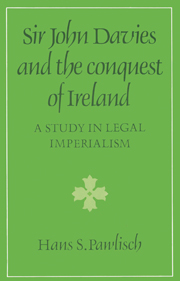Book contents
- Frontmatter
- Contents
- Preface
- Abbreviations
- PART I INTRODUCTION
- 1 Law as an instrument of colonization
- 2 Sir John Davies: a biographical sketch
- 3 Ireland and the origins of stare decisis
- PART II JUDICIAL ENCOUNTERS: THE NATIVE COMMUNITY
- PART III JUDICIAL ENCOUNTERS: THE COLONIAL COMMUNITY
- PART IV CONCLUSION
- Notes
- Select bibliography
- Index
- Cambridge Studies in the History and Theory of Politics
1 - Law as an instrument of colonization
from PART I - INTRODUCTION
Published online by Cambridge University Press: 13 October 2009
- Frontmatter
- Contents
- Preface
- Abbreviations
- PART I INTRODUCTION
- 1 Law as an instrument of colonization
- 2 Sir John Davies: a biographical sketch
- 3 Ireland and the origins of stare decisis
- PART II JUDICIAL ENCOUNTERS: THE NATIVE COMMUNITY
- PART III JUDICIAL ENCOUNTERS: THE COLONIAL COMMUNITY
- PART IV CONCLUSION
- Notes
- Select bibliography
- Index
- Cambridge Studies in the History and Theory of Politics
Summary
The sixteenth and early seventeenth centuries in Ireland constitute one of the great watersheds in Irish history, a decisive period that witnessed the reduction of the whole island to effective English sovereignty. This conquest was not, however, the result of a consistent expansionist policy until the reign of Elizabeth, when an aggressive Dublin administration led by Sir Henry Sydney (1569–76) succeeded in establishing a militant programme that eventually tied successive administrations to extending English influence by forcible means into areas hitherto beyond the reach of crown government. Yet it was not until the end of Elizabeth's reign that the final contest for Irish sovereignty was fought. From 1594 until 1603, Hugh O'Neill, the Earl of Tyrone, led the last great Gaelic rebellion that shook the very foundations of English rule in Ireland and compelled the English government to commit financial resources that far exceeded the cost of military subvention in any of Elizabeth's continental wars.
The crushing success of English arms over rebel forces aided by Spain at the battle of Kinsale ultimately compelled O'Neill's unconditional submission to the Lord Deputy Mountjoy at Mellifont in county Louth on 30 March 1603 – six days after the death of Elizabeth. This military victory represented a necessary and primary phase in English domination over Ireland, but the second stage of political consolidation by judicial means was equally essential for England's lasting supremacy over the island.
- Type
- Chapter
- Information
- Sir John Davies and the Conquest of IrelandA Study in Legal Imperialism, pp. 3 - 14Publisher: Cambridge University PressPrint publication year: 1985



